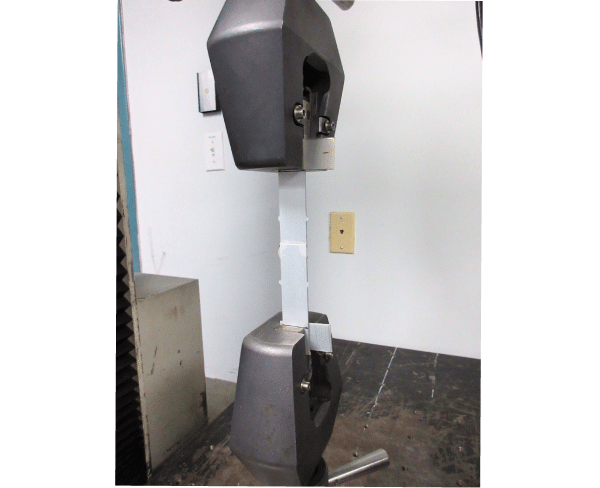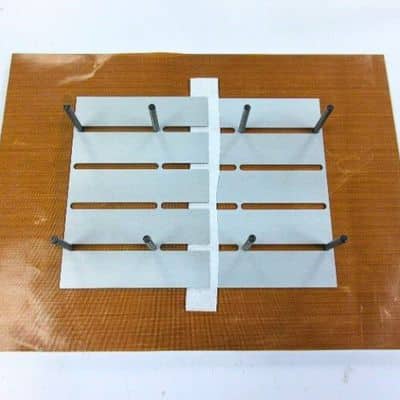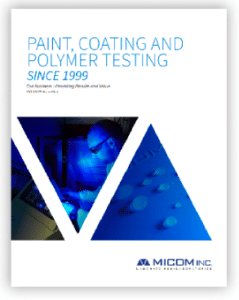ASTM D1002
Measuring The Apparent Shear Strength of Single-Lap-Joint Adhesively Bonded Metal Specimens by Tension Loading (Metal-to-Metal)
At Micom Laboratories, we offer ASTM D1002 testing as part of our comprehensive adhesives testing services. This method is essential in the aerospace and automotive industries, allowing the assessment of adhesive performance by measuring the apparent shear strength of single-lap-joint bonded metal specimens. Our testing helps you select the most suitable adhesives, ensuring optimal performance and reliability in specific applications.
About ASTM D1002 Testing
The ASTM D1002 standard is designed to evaluate the lap shear strength of adhesive bonds between metal substrates, such as aluminum and steel. This test is widely used in the adhesives industry for assessing adhesive performance in structural applications, as it measures the adhesive’s capacity to withstand shear forces in bonded joints.
In other words, ASTM D1002 helps determine:
- The maximum shear stress that the adhesive can withstand before failure
- The load at which the bonded joint fails, divided by the area of the bonded overlap
A thorough understanding of lap shear strength is vital for ensuring the reliability and safety of components across various industries.

The ASTM D1002 Testing Process
The ASTM D1002 testing process begins with the preparation of a single-lap joint, where two metal substrates are bonded using the adhesive under evaluation. Below is an overview of the key steps:
- Sample Preparation: The test specimen is a lap joint formed by bonding two metal strips with a specific overlap area. For most metals with a thickness of 1.62 mm (0.064 in.), the ASTM D1002 recommended overlap length is 12.7 ± 0.25 mm (0.5 ± 0.01 in.). The adhesive is applied between the overlapping surfaces, and the joint is allowed to cure according to the adhesive manufacturer’s instructions. Proper specimen preparation is essential to ensure accurate and consistent results.
- Adhesive Application: Each adherend needs to be perfectly aligned with its counterpart. It is, therefore, best to use an assembly jig with locating pins to align the adherends perfectly. Preparation of the test joints is done per section 7 of the standard and is very specific. Bonding surfaces are treated per the standard, and specimens are conditioned at specified temperatures and humidity levels to minimize variations that could impact lap shear strength. Many manufacturer specifications, beyond the requirements of the standard, will also require a specific pressure to be applied to the lap bond while it cures or will specify an adhesive bond line of a specific thickness to be achieved. Such additional requirements call for the use of additional assembly jigs.
- Shear Testing: Once the specimens are fully cured, each specimen is securely clamped by both ends in a tensile tester set of grips and a load is applied at a constant crosshead speed until failure occurs. The maximum force recorded during the test is then used to calculate the lap shear strength of the adhesive, providing invaluable insights into its performance in structural applications.

Benefits of ASTM D1002 Testing
- Quality control and assurance: ASTM D1002 testing ensures that adhesives meet required performance specifications, helping to maintain high quality in manufacturing processes.
- Product development and improvement: The test offers critical data that can guide the development and optimization of adhesive formulations, leading to improved product performance and innovation in bonding solutions.
- Compliance with industry standards: Conducting ASTM D1002 testing helps ensure that adhesives align with established industry standards, which is essential for building customer trust and meeting regulatory requirements.
- Performance validation: This testing method verifies the adhesive’s shear strength under controlled conditions, providing confidence in its reliability for structural applications.
Why Choose Our Lab
Micom Laboratories proudly serves clients across Canada and the USA, drawing on extensive experience to meet diverse testing needs. Our commitment to quick turnaround times ensures that you receive timely results without compromising quality, enabling you to keep projects on schedule. We offer competitive pricing that reflects our dedication to delivering value, making high-quality testing accessible to all industries. Our clients can rely on us for accurate and dependable results, as our state-of-the-art facilities and expert team uphold rigorous testing standards. At Micom Laboratories, we prioritize your success by providing the insights you need to make informed decisions.
Our Services
Micom Laboratories offers a comprehensive range of ASTM D1002 testing services.
- Standard Testing: We conduct tests in full compliance with ASTM D1002 specifications and similar standards.
- Custom Testing: We can develop modified test protocols to address your specific requirements.
- Environmental Testing: We can evaluate adhesive performance under various temperature and humidity conditions.
- Comparative Studies: We can assess multiple adhesives or surface treatments to determine optimal solutions.
- Failure Analysis: We investigate bond failures and provide recommendations for improvement.
Our Testing Capabilities
Our state-of-the-art laboratory is equipped with advanced testing equipment operated by a team of experienced professionals.
- ISO/IEC 17025 accredited material testing facility ensuring the highest standards of testing.
- Cutting-edge tensile testing machines for accurate force measurement.
- Environmental chambers for testing under various temperature conditions.
- Precision sample preparation equipment for consistent specimen quality.
- Advanced data acquisition and analysis software for reliable results.
Applications and Industries Served
Our ASTM D1002 and lap shear testing services cater to a wide range of industries.
- Aerospace: Testing adhesives used in aircraft assembly and maintenance.
- Automotive: Evaluating bonding strength in-vehicle components and assemblies.
- Construction: Assessing adhesives used in building materials and structural bonding.
- Electronics: Testing adhesives used in electronic component assembly.
- Medical Devices: Ensuring the integrity of bonded components in medical equipment.
- General Manufacturing: Supporting product development and quality control across various sectors.

Testing for the Aerospace Industry
As a materials testing laboratory, Micom often uses ASTM D1002 for acceptance testing of adhesives for the aerospace industry. Before each adhesive lot is sent to production, samples are sent to Micom to ensure product conformity to the manufacturer’s specifications, thus safeguarding the safety and reliability of the assemblies it is used for. Our fast turnaround time helps prevent production delays, keeping projects on track.
Complementary Testing under Polymer Testing
Comprehensive evaluation of multiple materials, such as adhesives, often requires a multi-faceted approach. In addition to ASTM D1002 testing, Micom Laboratories offers a range of complementary adhesive testing services, such as ASTM D1781, which measures the peel strength of adhesives, and ASTM D1876, which tests adhesive bonds between flexible substrates.
We also offer several other polymer-related tests to provide a complete understanding of material properties and performance. These include UV tests and accelerated aging tests, as well as many other physical and mechanical property tests. Don’t hesitate to call on our experts for a better understanding of adhesives and polymers testing services.
Frequently Asked Questions
Why is ASTM D1002 testing important?
ASTM D1002 testing is crucial for assessing the performance of adhesives in structural applications, ensuring that bonded joints can withstand shear forces. This testing helps manufacturers select the most suitable adhesives for their specific needs, enhancing safety and reliability.
What substrates can be tested using ASTM D1002?
The most common metal substrates used in ASTM D1002 testing are aluminum and steel. However, depending on the specific application and industry requirements, the test can be applied to various metal substrates. Other metal substrates that can typically be tested using ASTM D1002 include stainless steel, titanium alloys, and copper alloys.
How long does it take to receive results from ASTM D1002 testing at Micom Laboratories?
Micom Laboratories has a standard turnaround time of three weeks for lap shear testing. At the end of this period, clients receive all test results along with a detailed report. We prioritize efficiency while ensuring the quality and accuracy of our results.
Can Micom Laboratories accommodate custom testing requirements?
Yes, Micom Laboratories offers custom testing services. While ASTM D1002 provides standard conditions, we can develop modified test protocols tailored to your specific requirements and application environments. This flexibility ensures that we address your unique challenges and provide the insights you need about your adhesives. Our goal is to support your success with adaptable and reliable testing solutions.
What are the sample size and preparation requirements for ASTM D1002 testing at Micom Laboratories?
ASTM D1002 requires a minimum of five specimens per adherend/adhesive combination to ensure statistical validity. Depending on the application, additional specimens may be recommended.
What is the difference between ASTM D1002 and other lap shear testing methods?
ASTM D1002 is specifically for Metal-to-Metal applications. Lap shear testing can be done on various materials. Below is a list of other lap shear tests offered at Micom Laboratories:
- Bonded Plastics: ASTM D3164
- Tissue Adhesives: ASTM F2255
- Non-Rigid Adhesives: ASTM D3983
- Sealants: ASTM C961
- Fiber Reinforced Plastics: ASTM D5868
- Rigid Plastics: ASTM D3163


